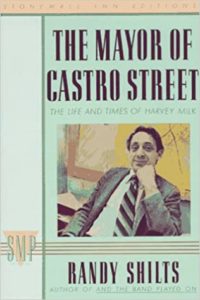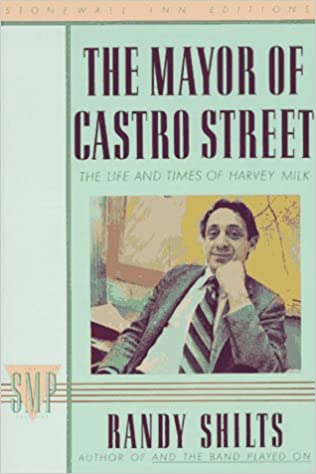
For my summer cottage reading, the first non-fiction book I’m reading is The Mayor of Castro Street by Randy Shilts. It’s about Harvey Milk. (Incidentally, I saw Milk speak in a downtown church in San Francisco in May or June 1978 at an event held by BACABI, the Bay Area Coalition Against the Briggs Initiative.)
Here are 4 interesting highlights from the first third of the book.
Harvey Milk’s early political views
A staunch conservative, Milk was then looking forward to Barry Goldwater’s getting the 1964 Republican presidential nomination. That could get the true conservative message out to the nation, he thought. His fiercest argument with Rodwell was not about gay equality, but [about] President Kennedy’s move against the steel companies. The raw use of federal power in the economy made Harvey’s blood boil.
DRH note: I remember reading in the late 1960s about JFK’s 1962 attack on steel companies for raising prices. Ayn Rand wrote about it at the time also, and Wabash College economics professor Ben Rogge talked about it in a talk in early 1969 at the University of Winnipeg that my Libertarian club sponsored. It was a big deal to us.
Destruction of a Vital Part of San Francisco
The Latino Mission district’s businesses had never recovered from the digging up of the central shopping strip for the Bay Area Rapid Transit.
DRH note: After I graduated from the University of Winnipeg in May 1970, I set out in June to hitchhike from Winnipeg to Vancouver and from Vancouver to Los Angeles, stopping at various places on the way. I stayed at a cheap, divy hotel in San Francisco (I think it was about $5 a night) and explored San Francisco. I remember the chaos created by the building of the BART at the time. I had to walk over boards in various parts of the city and it was difficult for people to get to certain businesses because the streets were so ripped up. Later I learned in George Hilton’s transportation economics class at UCLA just how badly BART failed a cost/benefit analysis test even judged by the optimistic estimates of its proponents.
The Leftist Attack on Milk’s Business
Some [left-wing gays] took to scolding Scott Smith [Milk’s business partner at Castro Camera], saying if Castro Camera really cared about people, the would give away free film and offer developing services gratis.
DRH note: No comment necessary.
John Barbagelata’s Confusion about the Economics of Discrimination
[Barbagelata, who was running for mayor of San Francisco against George Moscone] would continue to oppose the law banning anti-gay bias among city contractors because the city might be forced to accept higher bids from nondiscriminating companies over the low bids of biased employers.
DRH note: At the time, employers were discriminating against gay employees even in San Francisco. This presumably made gay employees a bargain for employers willing not to discriminate. So Barbagelata had it exactly backwards. He didn’t understand his Gary Becker. For the concise version of the economics of discrimination, see Linda Gorman, “Discrimination” in David R. Henderson, ed., The Concise Encyclopedia of Economics.


READER COMMENTS
Philo
Jul 14 2022 at 11:33am
It is quite possible that a firm that was considered to be practicing anti-gay discrimination might submit the low bid for a government contract for a particular job. If the government was debarred from dealing with such firms, it would have to pay more to get the job done. No general point about the economics of discrimination makes this impossible, or even unlikely.
David Henderson
Jul 14 2022 at 9:12pm
I disagree. A firm that purposely avoids hiring from a group that’s discriminated against will face higher costs and, therefore, will rarely be the low-cost bidder.
Jim Glass
Jul 16 2022 at 8:52pm
A firm that purposely avoids hiring from a group that’s discriminated against will face higher costs and, therefore, will rarely be the low-cost bidder.
I don’t know about that, as just how “rarely” would seem to depend on the cost structure of the industry and the amount of wages affected.
E.g, a quick look via Google says in the construction industry labor costs typically are about 30% of total cost. Let’s say as per the SF story it’s gays being discriminated against, they are 10% of the labor market and receive 20% lower wages (instead of not being hired at all, which is another story).
A construction firm that honorably hires gays at the 10% rate yet nastily stiffs their wages by the 20% reaps total operating cost savings of 30% x 10% x 20%, or 0.6%.
As non-labor costs are 70% of total cost, simple random variation of 1% of non-labor costs in any of the competing firms — including the gays-hiring one — would outweigh the 0.6% “labor price advantage”. I doubt that it would be visible in a project bid at all.
Now in a law firm, where labor cost is maybe 90% of total cost, and women (near 50% of workers) are being discriminated against, that’s a whole different case.
Ron Browning
Jul 15 2022 at 7:23am
Bigots are demonized and discriminated against. Employers who make use of their talent while providing an environment congenial to the employees bigoted ways, can obtain the services of these bigots at a reduced price. These firms can then be quite competitive despite any sneering from others. Surely no one thinks that bigots command a higher price in the market?
David Henderson
Jul 15 2022 at 7:53am
I think you’re forgetting how common it was to be anti-gay in the 1970s, even in San Francisco. The discrimination was largely against gays, not against those who were prejudiced against gays.
Mactoul
Jul 15 2022 at 10:02pm
What price freedom of association?
A non-defense of anti-discrimation laws from libertarian perspective.
I wonder if it is possible to provide a defense that is argued.
David Henderson
Jul 16 2022 at 10:01am
You write:
A defense of what?
Notice that this had to do with contractors dealing with the city. It’s completely legitimate, and even required, from a libertarian viewpoint, for the city government to require that its contractors not discriminate.
Jim Glass
Jul 16 2022 at 8:08pm
Barbagelata had it exactly backwards. He didn’t understand his Gary Becker.
Well, I’d be surprised if Barbagelata knew Becker existed — but still wouldn’t assume that his warning about the bidding results was entirely wrong.
I’m fully on board with “markets beat discrimination”, having seen it with my own eyes. I got out of law school with the first flood of women doing so. Some of the big old law firms discriminated against women, others hired them. The latter did very well and the former soon caught on. But the discrimination mechanism involved wasn’t wages, it was hiring. Prestige law firms can’t be seen doing nasty entry level wage discrimination, but they can easily “not hire”. The firms that hired women right away got all the best female brains in a field where those brains were valuable.
A dramatic example of this discrimination mechanism (‘not wages, hiring’) in action is the University of Alabama football program, 1970. Governor George Wallace had just run for president while loudly barring blacks from UofA and notoriously proclaiming “segregation now, segregation tomorrow, segregation forever” . That lasted all the way until Alabama’s football team was clobbered by an integrated USC team in its opening game of the season. Alabama’s team was fully desegregated the next year.
This is a great story, and when dealing with market skeptics I find it much more convincing to them than citing economic tomes. (No offense to Becker.)
OTOH, as to Barbagelata … this comment is getting long so ill put the ‘other hand’ in a follow-up.
Jim Glass
Jul 16 2022 at 9:33pm
Continuing…
OTOH, the Becker analysis assumes wage differentials are a major cost of business that pass right to the bottom line in a very competitive bidding market. Maybe, or maybe not. Municipal contracting typically involves a smallish number of firms with different cost structures who know each other and bid based on what they think the others can afford.
Say BestConstructionCo normally would expect to get the prime job available by making a low bid others can’t match due to its superior operating efficiency. But then its smart management decides that by qualifying for the legislated “gay hiring bidding preference” it can increase the price of its bid to equal or higher than its competitors and still win – and pocket the savings from the lower wages paid to its newly hired gays too. Could happen.
There’s a bunch of “ifs” in that, and in the long run it may all be socially optimal anyhow as the competitors would adjust, gays get into the job market, etc. But in the short run BestCo gamed the system to profit at taxpayer expense. Barbagelata maybe wasn’t entirely ignorant — knowing less about economic principles but more about the municipal bidding system.
Again, I’m all for “markets beat discrimination”, but no matter the high economic principle, the devil is in the details as the rubber meets the specific facts on road etc., no result should be assumed pure and automatic.
David Henderson
Jul 17 2022 at 10:59am
You wrote:
I would be too. It was my attempt at slight humor.
Great example re Wallace.
David Henderson
Jul 17 2022 at 11:02am
You wrote:
I agree with you, if that is your point, that it would widely be seen as nasty. I don’t think it’s nasty, though, to give opportunities to people that other employers aren’t giving and that they gain from. It wouldn’t be nasty for employees to seek out employers paying more to them than they pay others. It’s symmetric.
Comments are closed.